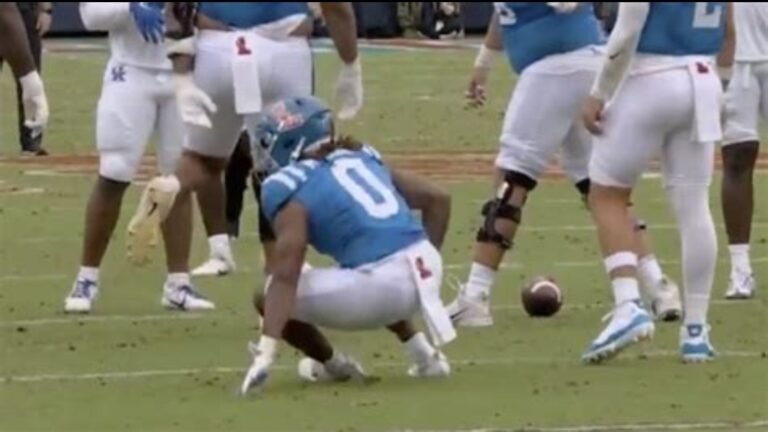In October 2024, the University of Mississippi’s football program, commonly known as Ole Miss, found itself at the center of a significant controversy.
Allegations surfaced accusing the team of instructing players to feign injuries during games to disrupt the offensive momentum of their opponents. This tactic, while not explicitly prohibited by existing rules, has been widely criticized for undermining the spirit of fair play in college football.
The controversy gained national attention during a matchup against the University of Kentucky. In this game, Ole Miss running back Matt Jones appeared to simulate an injury following a signal from quarterback Jaxson Dart. This incident was perceived as a deliberate attempt to slow down Kentucky’s offensive drive, leading to widespread condemnation from fans, analysts, and opposing teams. Critics argued that such actions not only disrupt the flow of the game but also raise ethical concerns about sportsmanship.
In response to the mounting criticism, Ole Miss released an official statement addressing the allegations. The statement acknowledged the discussions surrounding feigned injuries and indicated that the program had been in communication with the National Coordinator for Football Officiating, providing relevant medical information for review. Additionally, the university updated the Southeastern Conference (SEC) office on the matter and emphasized that head coach Lane Kiffin would communicate with coaches and players to ensure proper conduct and compliance.
Despite the official response, skepticism remained among the college football community. Reports indicated that multiple SEC coaches believed the tactic effectively granted Ole Miss an additional three to four timeouts per game. This perception led to increased scrutiny, with several teams submitting video evidence to the SEC and the National Coordinator for Football Officiating for further investigation.
The issue of feigned injuries is not unique to Ole Miss; it has been a growing concern across college football. High-tempo offenses can tire defenses, and some teams may resort to questionable methods to slow the pace. In 2021, Coach Kiffin himself commented on the need for rule changes to address the issue, suggesting that players who leave the field due to injury should be required to sit out for a certain number of plays.
The controversy has prompted discussions about potential rule modifications to deter teams from employing such tactics. Proposed solutions include implementing penalties for teams found guilty of feigning injuries or requiring injured players to remain sidelined for an extended period, thereby reducing the incentive to fake injuries. The overarching goal of these proposed changes is to preserve the integrity of the game and ensure a level playing field for all teams.
As the 2024 season progressed, the spotlight remained on Ole Miss and its handling of the situation. The controversy underscored the broader challenges faced by college football in balancing competitive strategies with sportsmanship and fair play. The outcome of this debate could lead to significant changes in how the game addresses and penalizes unsportsmanlike conduct in the future.



